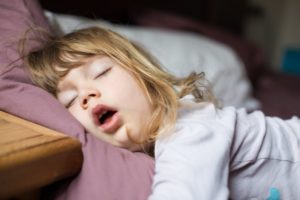
Do you hear loud snoring coming from your child’s bedroom at night? Is your little one always tired during the day no matter how early they go to bed? These may be signs that your kid has sleep apnea, a disorder characterized by episodes of not breathing during sleep. It’s usually caused by tissues in the back of the mouth and the throat collapsing and obstructing the airway. This impairs your child’s ability to get a good night’s sleep, which is why you should get it treated as soon as possible. Continue reading to learn all about the symptoms and possible treatments for children’s sleep apnea.
Symptoms of Children’s Sleep Apnea
At night, a kid with sleep apnea might:
- Toss and turn or sleep with their head in unusual positions
- Snore loudly and frequently
- Heavily sweat during sleep
- Have pauses in their breathing
- Gasp or snort while they sleep
During the day, you may notice the following symptoms in your child:
- Difficulty waking up
- Headaches in the morning
- Irritable, aggressive behavior
- Social or academic problems
- Falling asleep during the day
- Speaking with a nasal voice
- Regularly breathing through their mouth
If any of these symptoms sound familiar, visit your child’s dentist as soon as possible for treatment.
How Your Dentist Can Treat Sleep Apnea
Sleep apnea generally has two treatment options: CPAP machine and oral appliance. With the first option, a mask is worn over your kid’s nose to keep the airway open and free of obstruction. It supplies your child with a steady stream of air that essentially does their breathing for them.
CPAP machines do make a lot of noise, which may interfere with your child’s quality of sleep. This is where oral appliances come in. They are devices worn over the teeth to gently move the lower jaw forward and reposition the tongue so as to not block the airway during sleep. Since oral appliances make no noise, your child may prefer them. Try out both options and see what works best for your son or daughter.
How to Maintain a Regular Sleep Schedule
Even if your young one doesn’t have sleep apnea, back-to-school season is a great time to get on a regular sleep schedule by implementing the following tips:
- Turn off electronics at least one hour before bed.
- Try out relaxing activities before bed, such as a warm bath or reading.
- Go to bed at the same time every night, including weekends.
- Keep technology out of the bedroom.
- No naps close to bedtime.
- Spend time outside each day.
Children’s sleep apnea is a serious condition that can affect not only their quality of sleep, but their quality of life. Get treatment from their dentist as soon as possible.
About the Author
Dr. Pamela West has been involved in the treatment of sleep apnea for more than five years now. She is a member of the American Academy of Dental Sleep Medicine, and works with a team of leading experts in the field across Nevada. If your child is experiencing symptoms of sleep apnea, contact Dr. West by clicking here or by calling (702) 602-2000.
